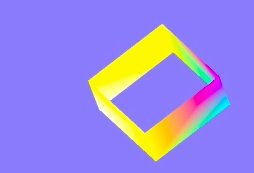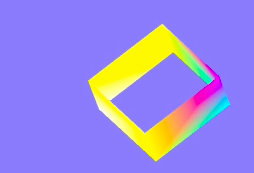
上と下が穴になっている、ぺらっぺらの箱をOpenGL ESで描画するiPhoneアプリを書いてみる。
動作イメージ
XcodeからiOS6 iPhone Simulatorで動かすとこんな感じになります。
サンプルコード
// ————————-
// ViewController.h
// ————————-
#import <GLKit/GLKit.h>
@interface ViewController : GLKViewController
@end
// ————————-
// ViewController.m
// ————————-
#import “ViewController.h”
typedef struct
{
float Position[3];
float Color[4];
} Vertex;
const Vertex vertices[] = {
{{0.0, 0.0, 0.0}, {1,1,0,1}},
{{1.0, 0.0, 0.0}, {1,0,1,1}},
{{0.0, 0.0, 0.5}, {1,1,0,1}},
{{1.0, 0.0, 0.5}, {0,1,1,1}},
{{0.0, 1.0, 0.0}, {1,1,0,1}},
{{1.0, 1.0, 0.0}, {1,1,0,1}},
{{0.0, 1.0, 0.5}, {1,1,1,1}},
{{1.0, 1.0, 0.5}, {1,1,0,1}},
};
const GLubyte indices[] = {
0,1,2, 1,3,2,
1,5,3, 5,7,3,
7,5,4, 6,7,4,
6,2,0, 6,0,4,
};
@interface ViewController () {
GLuint vertex;
GLuint index;
int degree;
}
@property (nonatomic, strong) GLKBaseEffect *baseEffect;
@property (nonatomic, strong) GLKView *gv;
@end
@implementation ViewController
@synthesize baseEffect, gv;
– (void)loadView
{
self.view = [[GLKView alloc] initWithFrame:CGRectMake(0, 0, 320, 568) context:[[EAGLContext alloc] initWithAPI:kEAGLRenderingAPIOpenGLES2]];
}
– (void)viewDidLoad
{
[super viewDidLoad];
gv = (GLKView *)self.view;
gv.drawableDepthFormat = GLKViewDrawableDepthFormat16;
[EAGLContext setCurrentContext:gv.context];
self.baseEffect = [[GLKBaseEffect alloc] init];
self.baseEffect.colorMaterialEnabled = GL_TRUE;
glClearColor(.5f, .5f, 1.0f, 1.0f);
glGenBuffers(1, &vertex);
glBindBuffer(GL_ARRAY_BUFFER, vertex);
glBufferData(GL_ARRAY_BUFFER, sizeof(vertices), vertices, GL_STATIC_DRAW);
glGenBuffers(1, &index);
glBindBuffer(GL_ELEMENT_ARRAY_BUFFER, index);
glBufferData(GL_ELEMENT_ARRAY_BUFFER, sizeof(indices), indices, GL_STATIC_DRAW);
glBindBuffer(GL_ARRAY_BUFFER, vertex);
glEnableVertexAttribArray(GLKVertexAttribPosition);
glVertexAttribPointer(GLKVertexAttribPosition, 3, GL_FLOAT, GL_FALSE, sizeof(Vertex), NULL+0);
glEnableVertexAttribArray(GLKVertexAttribColor);
glVertexAttribPointer(GLKVertexAttribColor, 4, GL_FLOAT, GL_FALSE, sizeof(Vertex), NULL + offsetof(Vertex, Color));
glEnable(GL_DEPTH_TEST);
glEnable(GL_BLEND);
// glEnable(GL_CULL_FACE);
}
– (void)glkView:(GLKView *)view drawInRect:(CGRect)rect
{
[self.baseEffect prepareToDraw];
glClear(GL_COLOR_BUFFER_BIT | GL_DEPTH_BUFFER_BIT);
const GLfloat aspectRatio = (GLfloat)gv.drawableWidth / (GLfloat)gv.drawableHeight;
self.baseEffect.transform.projectionMatrix = GLKMatrix4MakeScale(0.6f, 0.6 * aspectRatio, 0.6f);
glDrawElements(GL_TRIANGLES, sizeof(indices)/sizeof(indices[0]), GL_UNSIGNED_BYTE, 0);
GLKMatrix4 modelViewMatrix = GLKMatrix4Identity;
modelViewMatrix = GLKMatrix4Rotate(modelViewMatrix, GLKMathDegreesToRadians(degree), 1, 0, 1);
self.baseEffect.transform.modelviewMatrix = modelViewMatrix;
degree++;
}
– (void)dealloc
{
GLKView *view = (GLKView *)self.view;
[EAGLContext setCurrentContext:view.context];
if (0 != vertex) {
glDeleteBuffers(1, &vertex);
}
if (0 != index) {
glDeleteBuffers(1, &index);
}
view.context = nil;
[EAGLContext setCurrentContext:nil];
}
– (void)didReceiveMemoryWarning
{
[super didReceiveMemoryWarning];
// Dispose of any resources that can be recreated.
}
@end
